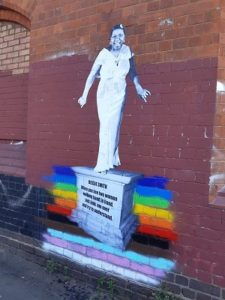Blues icons Bessie Smith and Gladys Bentley mark Black Pride.
Striking murals featuring blues legends Bessie Smith and Gladys Bentley have appeared in Birmingham, in protest of the city’s annual Pride celebrations. The empowering pieces can be found on Bradford Street, situated in the central bohemian region of Digbeth.
The murals provide an empowering statement for QTIPOC communities who are often overshadowed by whiteness and the commercial gaze that dominates the city’s annual Pride celebrations. This work highlights the importance music played in forming the history of Black LGBTQI communities all over the world.

The creator anonymously commented: “They are for black people, they are for you. They are for your joy, they are to continue reminding us to empower ourselves. To energise you to do what you need to do in the world, whatever that is, with that feeling of joy.”
“We have to look at the past to reclaim identities and to reclaim space. Music is one example of many of how Black culture was stolen and depoliticized by white culture. Blues, jazz and skinhead music originated within political Black movements. These musicians told and tell the stories of the history of slavery, of segregation, of pain but also the power that it took to fight through that.”
“We need this reclamation especially in the Queer community because it’s white-washed. Pride Festival does a poor job of representing people and the diversity of creativity within our culture, and we need to change that.”
“It’s important to put names to souls and for them to be seen. Putting these figures on plinths and on walls are a celebration of lives who have contributed to communities. To recognize the importance of what we represent. We don’t have statues of people from black heritage, we don’t have statues of Queer icons. Now we do. They are a message to racialized people across the city, to you. Continue to speak louder, continue to empower yourselves.”
Suriya Aisha the founder of Unmuted, a Birmingham based charity that provides safe spaces and better representation for QTIPOC communities,added: “It’s so brilliant to see art work like this in our city, at this time of the Black Lives Matter movement, it’s so great to see Black Queer history considered within this. As many folks have said, Pride wasn’t cancelled, it’s back. Revolution, Resistance and Reclamation are all part of our Queer roots, so lovely to see it celebrated.”
Birmingham based street artist Foka Wolf commented: “It is great to see thought provoking artwork pop up on the streets of Birmingham. We have a rich history of Black music and culture in this city and I think it is something that needs to be shouted about more often. This addresses that issue perfectly and I look forward to seeing more positive diverse art popping up on our streets.”


